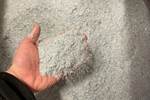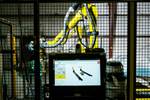AOC and partners achieve styrene-free composite RV roof
Indupol, Büfa and AOC brought their materials and fabrication know-how to yield a styrene-free gelcoat and RTM formulation for the manufacture of luxury vehicle roofs.
Knaus Tabbert camper sporting its new, styrene-free composite roof. An example of this product was exhibited at the JEC Mobility Planet during JEC World 2024. Source | Knaus Tabbert
Plastics fabrication company Indupol (Arendonk, Belgium), resins and specialty materials supplier AOC (Schaffhausen, Switzerland) and composite solutions company Büfa (Rastede, Germany), have worked together on using a styrene-free gelcoat and a styrene-free resin transfer molding (RTM) formulation for manufacturing fiberglass composite camper roofs for customer Knaus Tabbert, a luxury vehicles company based in Germany. Combining these novel materials yielded molded parts with optimal aesthetics and mechanical strength, with close-to-zero emissions inside the vehicle.
Knaus Tabbert is a manufacturer of motor homes, caravans, camper vans and crossover utility vehicles in Europe. The company offers a broad selection of vehicles, ranging from compact, entry‐level models to luxury class.
Indupol has been a long-standing supplier to Knaus Tabbert, making high-quality roof assemblies used in multiple series of recreational vehicles (RVs) with a traditional styrene-based gelcoat. With upcoming changes, European legislation is now requiring camper interiors to have very low levels of volatiles, to ensure health and comfort to camper end users.
“Indupol is pushing the limits in composite part manufacturing and is used to working very closely both with customers and suppliers,” explains Frank Jansen, managing director of Indupol. “So we like introducing new material solutions, as well as developing any necessary production technology in-house. In this way, we build robust and consistent manufacturing processes for meeting the challenging needs of our customers.”
To meet these new requirements, Indupol used a styrene-free gelcoat and RTM formulation combination for making components with close-to-zero emissions. AOC proposed a novel styrene-free Beyone 215-A-01 formulation, enabling a smooth injection process, which Büfa supplied to Indupol; both AOC and Büfa have spent many years developing these products, and are expecting the technologies to be broadly commercialized in the near future.
“This is the first time a part with such high aesthetic requirements was made on commercial scale with these materials,” Lothar Kempf, managing director of Büfa Composites GmbH, contends. “Büfa has been continuously pushing the limits of chemistry and application technology.”
Ultimately, the styrene-free feature ensures that the interior of the camper remains practically odor-free and is healthy and comfortable during use. At the same time, improved surface aesthetics, high mechanical strength and an aerodynamic shape were achieved, ensuring the roof is fully integrated with the rest of the vehicle; the final roof assembly can be pushed out at the camping site, enlarging the space inside the camper.
“AOC has a track record of developing new material solutions and bringing these to commercial reality,” adds Stefan Osterwind, managing director EMEA for AOC. “We like to run such projects closely together with our customers, so we learn as a team and can accelerate our new product introductions. We are convinced the open collaboration helps to build a sustainable and successful business.”
Related Content
-
Glass fiber-reinforced Akulon RePurposed recyclate enables Ahrend sustainable office chair
Envalior 30% glass fiber-reinforced Akulon RePurposed material helps Ahrend achieve lighter task chair with closed-loop value chain and reduced emissions.
-
Carbon Mobile, SABIC to develop, deploy advanced carbon fiber in connected devices
Collaboration aims to deliver the next generation of thinner, lighter, stronger and more sustainable composite materials used in consumer electronics and automotive industries.
-
Syensqo provides PARA resin for Artiphon musical instrument
Artiphon has chosen Syensqo’s Ixef PARA fiber-filled resin in the production of Chorda, its custom handheld electronic musical instrument.

















